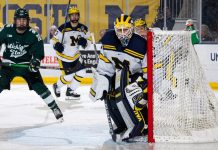
Much attention has been given to the early-season abundance of power plays and penalty kills and the impact of high (or undesirably low) percentages in both categories.
“I don’t know if there’s anybody in the country that hasn’t had to put special teams at the forefront,” Merrimack coach Mark Dennehy said. “For the first three weekends, it has become a special teams game. We spend half our time in practice on special teams because half the game is special teams.”
But there’s a third side to the special teams triangle — one that’s usually mentioned only as an afterthought if it’s mentioned at all — but is proving to be a crucial in many contests.
Shorthanded goals.
Both for and (especially cringe-worthy) against.
On Friday night, Massachusetts-Lowell, a team that scored four shorthanded goals all last year, scored two in the second period alone to break open a tied game.
On Saturday, New Hampshire lost to Colorado College, 4-3. Not only did UNH go 0-for-7 on the power play while CC went 2-for-6, but the Wildcats also gave up two shorthanded goals in the opening six minutes to dig a hole from which they could never totally crawl out of. They did score once themselves on the PK–making it a total of three between the two teams–but you’ve got almost no chance when your man-advantage unit finishes a net two goals down.
Last year, by contrast, six of the 12 Hockey East teams scored only one or two shorties all season long. League teams gave up 31 shorthanders to other teams while scoring 39 of their own. This year, just three weekends into the season, those numbers are 14 and 11, respectively. That is, they’ve already given up almost half of what they gave up all last year.
“Either you have your regular guys out there and they’re tired which is going to lend itself to more opportunities,” Dennehy theorizes, “or you’ve got to go deeper down your roster and put kids into positions that maybe they haven’t been in the past. Instead of having two units, you might have three or maybe even four power-play units.
“You have to because half the game is power play. If you’re not on a power play or killing unit, you can go long stretches of the game and not play. You might have to stretch again by the time your number gets called. So because of that, it’s created opportunities.”
The two teams that have taken best advantage of that opportunity are Lowell and Boston University. As noted before, the River Hawks used two shorthanded goals to default St. Lawrence on Friday.
“We have an aggressive penalty kill so we’re always thinking about it,” Lowell’s John Edwardh said after the win. “First and foremost, we’re thinking about killing the penalty, but we have the green light if we see fit.”
Lowell coach Norm Bazin added, “I don’t know if you go out [intending] to score a shorthanded goal, but if you have the mentality to be aggressive, they usually come as a result.”
BU, however, tops all others with four shorthanded goals. Other than the outrageously high total for so early in the season, that shouldn’t be a surprise since the Terriers are arguably the league’s most talented team.
“If you’re on a power play and all of a sudden you see guys like Clayton Keller, Jordan Greenway, JFK [Jakob Forsbacka Karlsson], Patrick Harper, and Kieffer Bellows killing [the penalty], that creates a psychological dynamic before the puck is even dropped,” BU coach David Quinn said. “When you have good players out there killing penalties, the other team notices. Maybe they get a little more cautious or a little more nervous because they know if they make a mistake they could put themselves in a position all of a sudden to give up a shorthanded goal. That’s something that we certainly try to take advantage of.”
And because BU has a wealth of elite players, Quinn doesn’t run ragged his top three or four to gain the special teams edge.
“We’re using eight forwards to kill penalties and we use all our D, so we’re lucky in that regard,” Quinn says. “We’re not going to wear people out. I don’t think we’ve had a forward play over 20 minutes [in a game] yet this year. We’re fortunate that we do have a bunch of forwards we trust with killing penalties.”
So it’s no surprise that Quinn feels optimistic about the tighter enforcement of the rules. The best offensive players will get to flash more without being shackled by quasi-legal defensive techniques — the Jack Eichels and Johnny Gaudreaus of college hockey benefit more than Sammy Sledgehammer. And having a wealth of top players makes for a special teams advantage while the rest of the sport adjusts.
“I think it’s good for hockey,” he says. “People love offense in any sport, whether it’s football, basketball, hockey or baseball. Everybody likes points. I think it will help us, because I think we do have some talented players, but there are a lot of talented players in college hockey.
“It’s been a tough transition for the players and the referees. We’re all learning what a penalty is, but if people are patient this is all going to work out.”
U-turn at Merrimack
Merrimack got off to a rocky start, the Warriors losing their first three games: 2-1 to Sacred Heart, 4-0 to Clarkson and 4-1 to St. Lawrence.
Last weekend, however, a sweep of Colgate made for a quick U-turn.
“It’s easy to go back and look at individual situations and explain them away, but at the end of the day, it’s about how we play and we really didn’t play great in any of those games,” Dennehy said. “This weekend was just a result of us playing better.
“This time of the year, that’s what you’re striving to do. You’re trying to get better every time you go on the ice, whether it’s in practice or in the game. So I thought we took a good step forward.
“I like our team and I’ve said that from the start of this season, but we just really hadn’t gotten the type of performance from enough players to put anything together. That’s probably what we’re probably looking for now as coaches, more than anything. Now we’re going to be looking for a little more consistency. Even in our games this weekend, we’d go through a stretch where we were doing some really good things, and then there’d be a two-to-three minute period where we weren’t paying as much attention as we need to, or taking care of the puck as much as we need to. There’s just a little bit more of a drop off than we can have if we want to be a good team.”
Freshman Tyler Irvine has made a positive first impression, scoring his first goal this past weekend, but catching Dennehy’s eye before that.
“He’s had a big effect for us early on in the season,” Dennehy said. “He’s someone who has earned our trust in a number of situations. Honestly, the first three games we only had two good players each of those games. One of them was the goalie and the other one was Tyler.
“So he has separated himself on that front. He’s been our most consistent player.”
And the Warriors kept the momentum going on Tuesday night with a 2-2 tie with Boston College.
“Watch them on film, it’s Groundhog Day,” Dennehy said. “Instead of Johnny Gaudreau or Nathan Gerbe or Marty Reasoner or Brian Gionta, it’s Colin White and Ryan Fitzgerald. They’re skilled, so we [had] to play well.
“This time of year, your opponent doesn’t matter nearly as much as you do. We’re trying to get better and I thought we took a step in the right direction.”
BU bounces back
It caught observers such as myself by surprise when Denver, coming off two losses, swept BU a week ago. Perhaps we had anointed the Terriers as the team to beat in Hockey East a bit prematurely. But a 7-0 shellacking of Sacred Heart and especially a 3-0 shutout of Quinnipiac restored those expectations.
“A lot of people mentioned that they were surprised at what happened out in Denver, and I guess I’m surprised people were surprised,” Quinn said. “Number one, they’re a really good team. Their D-corps is as good as any D-corps in the country. They can skate, they’re tough to forecheck, they defend hard and they’re a really good team. They’d also gotten swept the weekend before. Any time you get swept, the next weekend takes on more of a meaning. They were two hard fought games, and we’re young.
“I know we won draft day, but that doesn’t mean anything in college hockey. The thing that I really liked was we competed. I just liked our make-up. We’re all as coaches trying to figure out what make-up our team has at this time of the season. The weekend ended and we lost two games, but I felt good about our team and what we were capable of because of some of the characteristics we showed out in Denver.
“I thought we competed, but I didn’t think we were hard to play against out in Denver. I still don’t think we fully understand what it’s going to take to create offense at the collegiate level because we’re so young, but we were much harder to play against this past weekend.”
Quinn’s comment about the team’s youth is well placed. While there is some experience on the blue line, which he considers the strength of the team, seven of the team’s top scorers are freshmen or sophomore and goaltender Jake Oettinger, who has excelled, is also a freshman.
“This is a big picture, long process for us,” Quinn says. “We’re not the ones writing about ourselves. Just because people write all this stuff about us, we don’t certainly feel that way. We love our team and we love the kids we have here. We love that we have a chance to be very good, but that doesn’t mean anything.
“You’re not talking about 20- and 21-year old sophomores and freshmen. You’re talking about 18- and 19-year-olds. We’re littered with teenagers and it’s just the makeup of our team right now. That’s why it’s going to take some time. We have a chance to be very good, but it depends on how we grow and if we continue to jell as a team and work hard and all those characteristics that you need to have success.”


